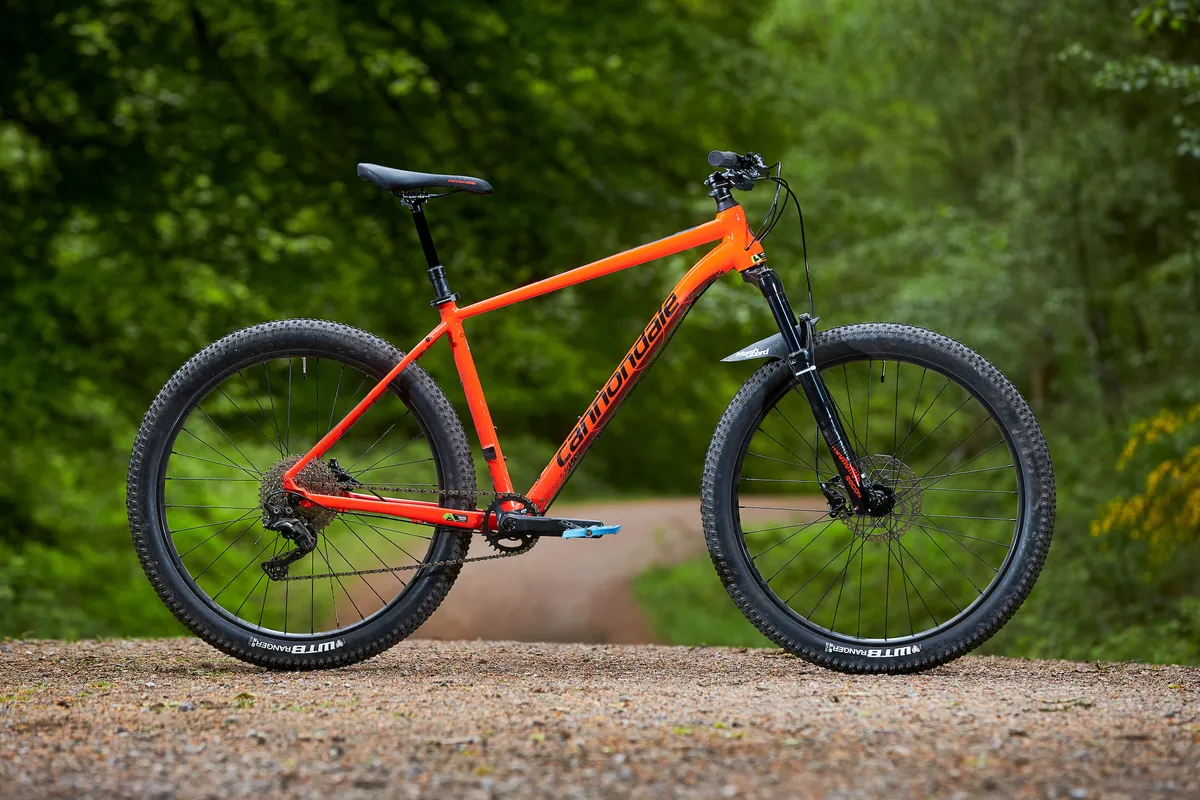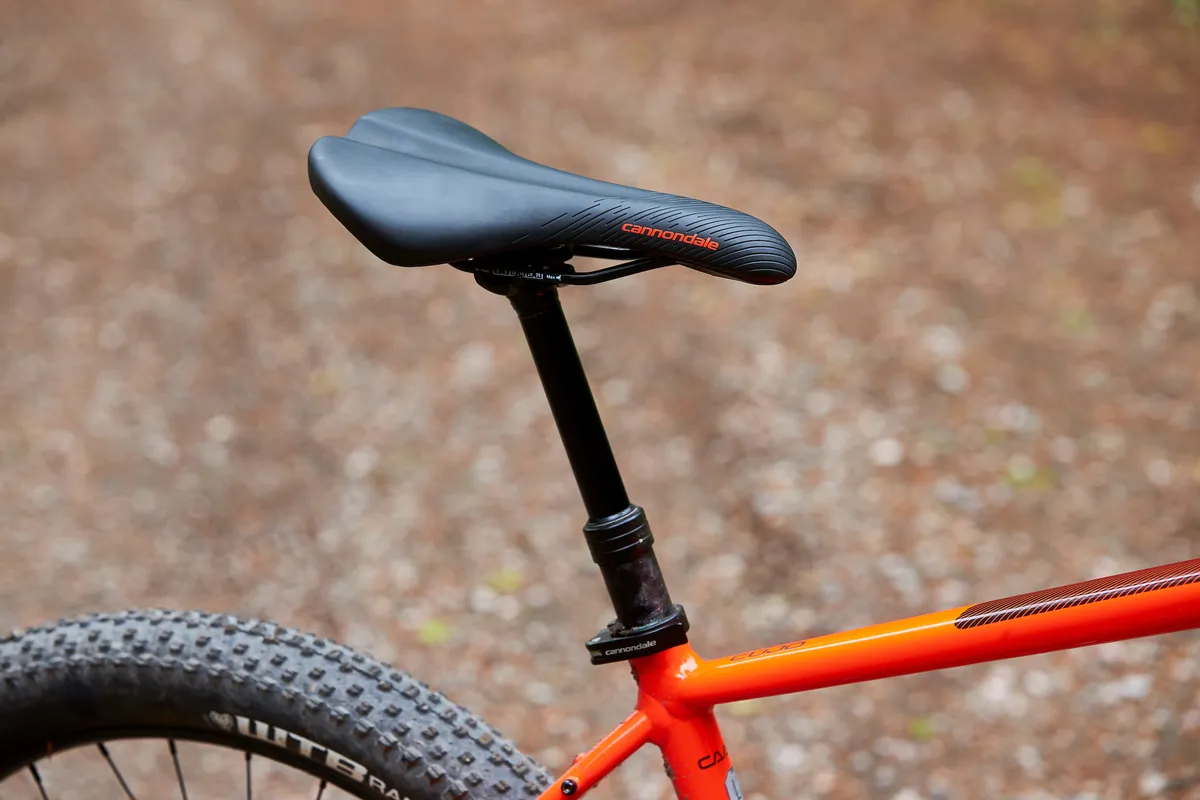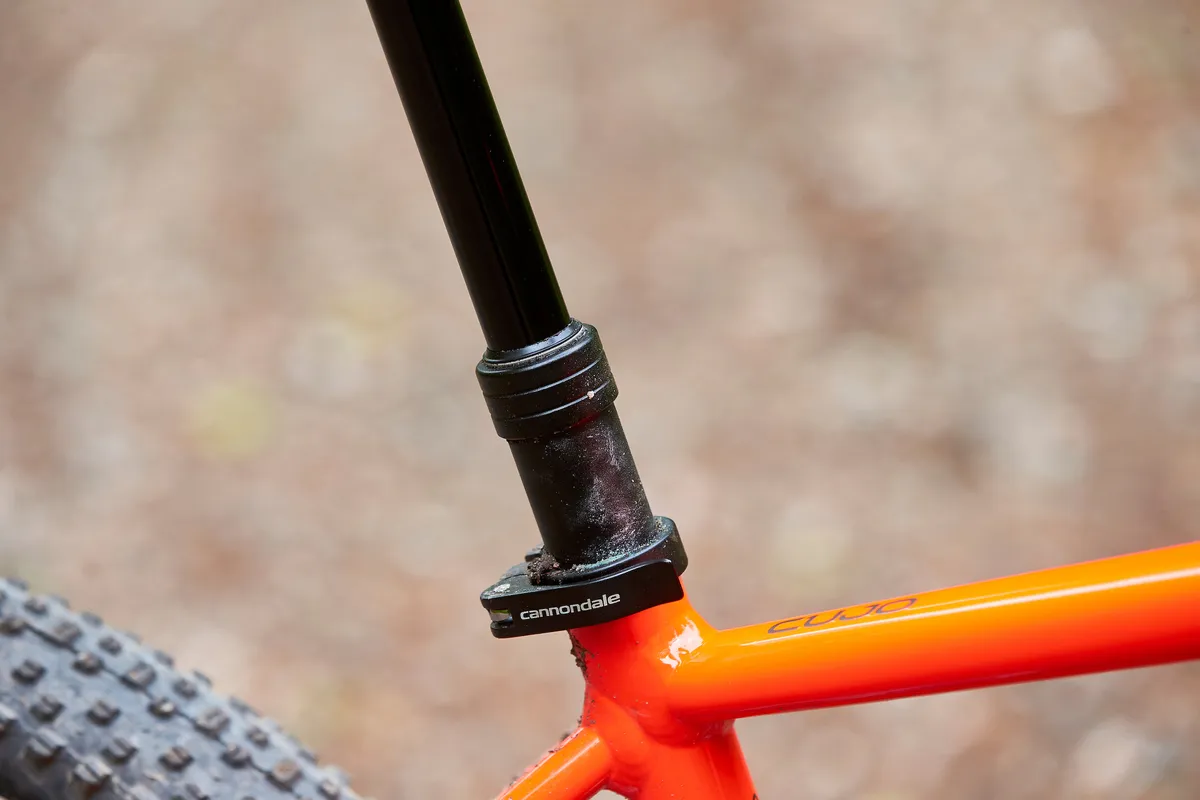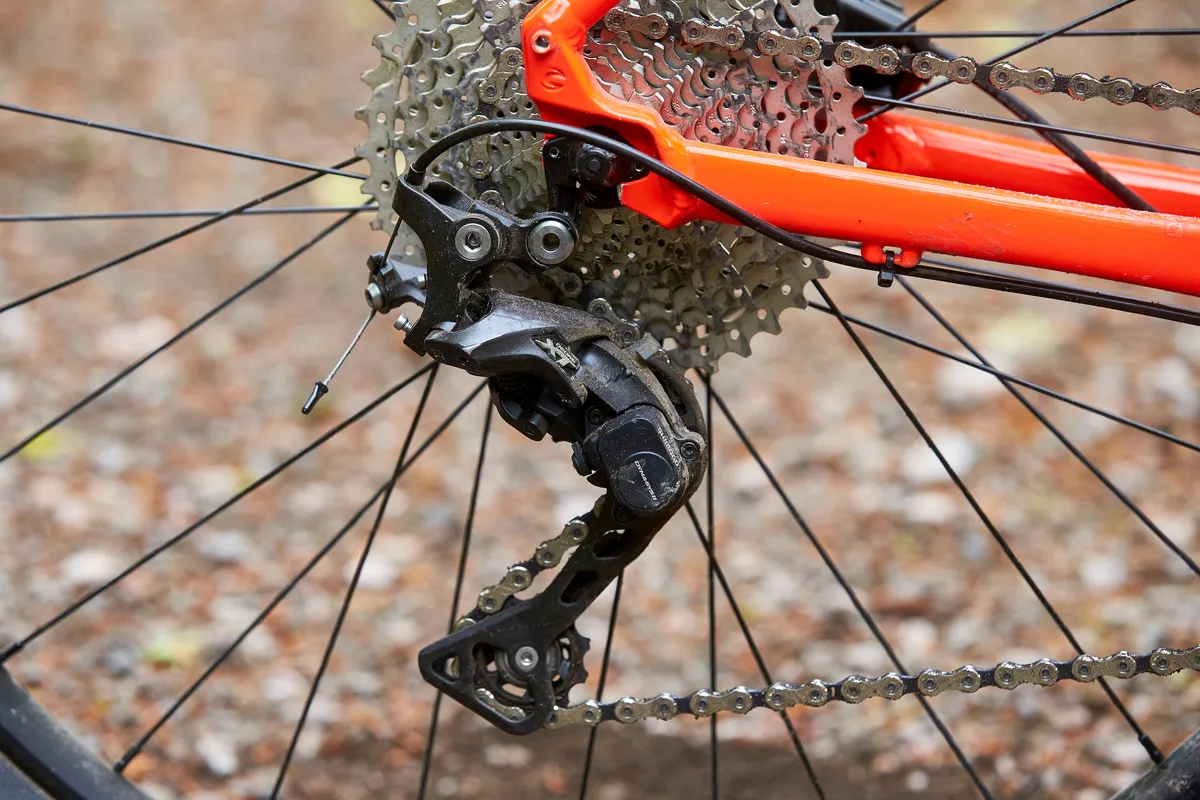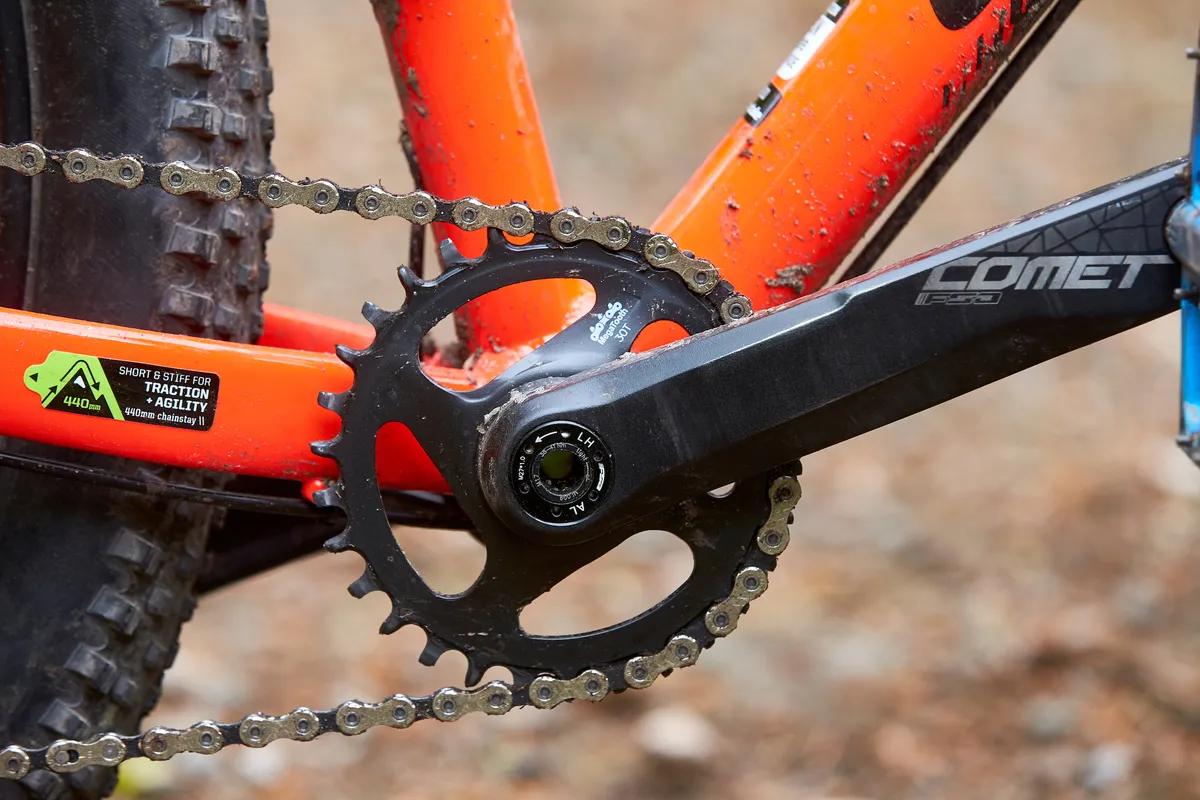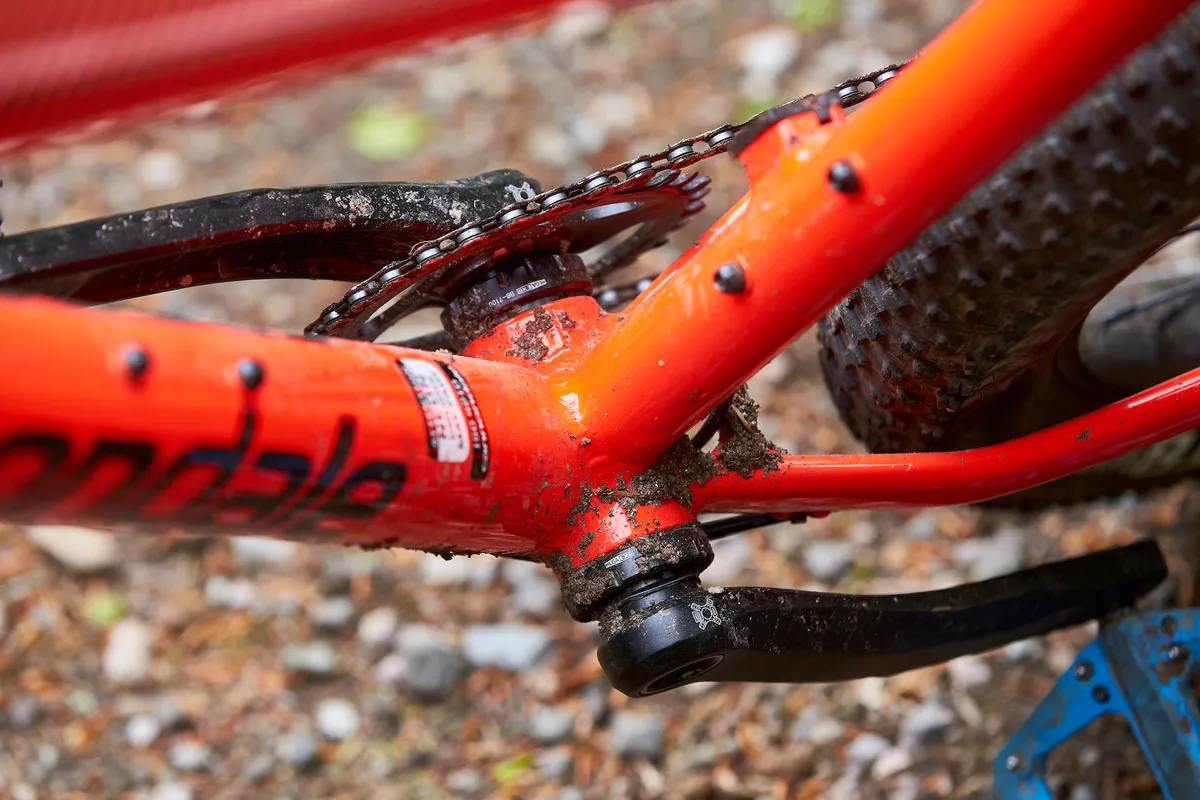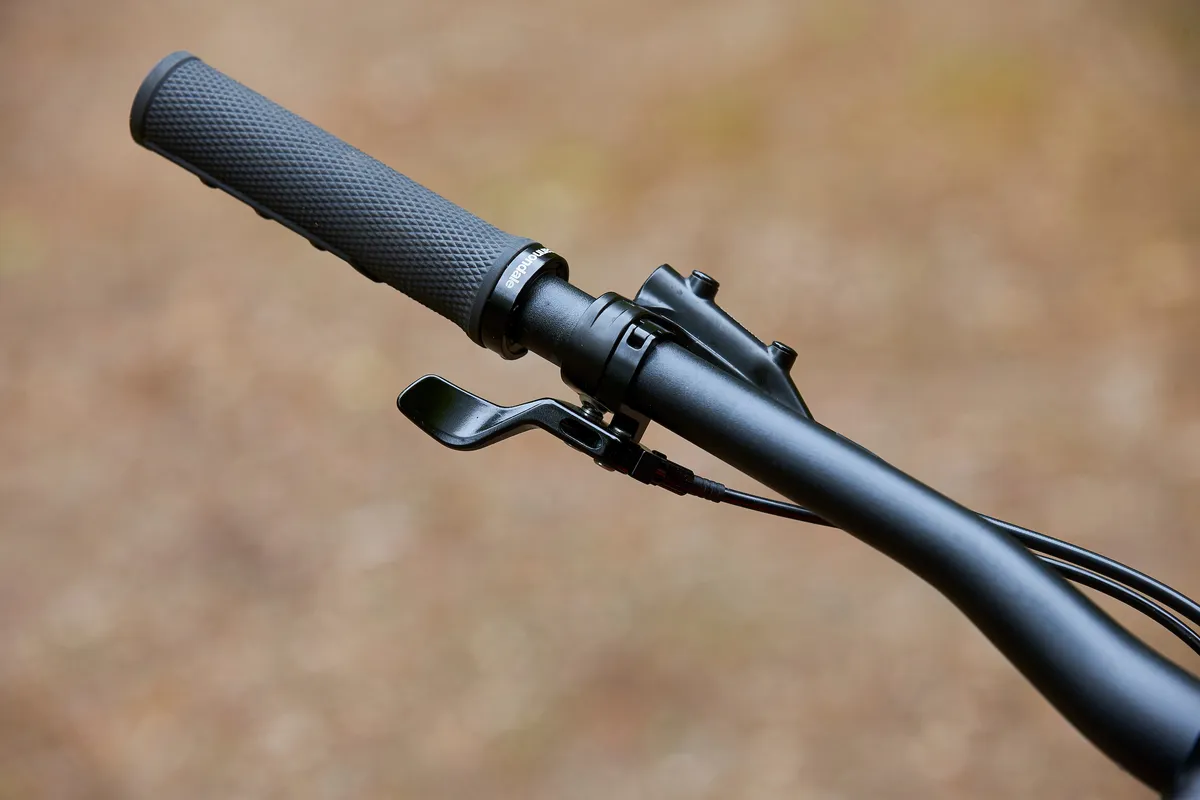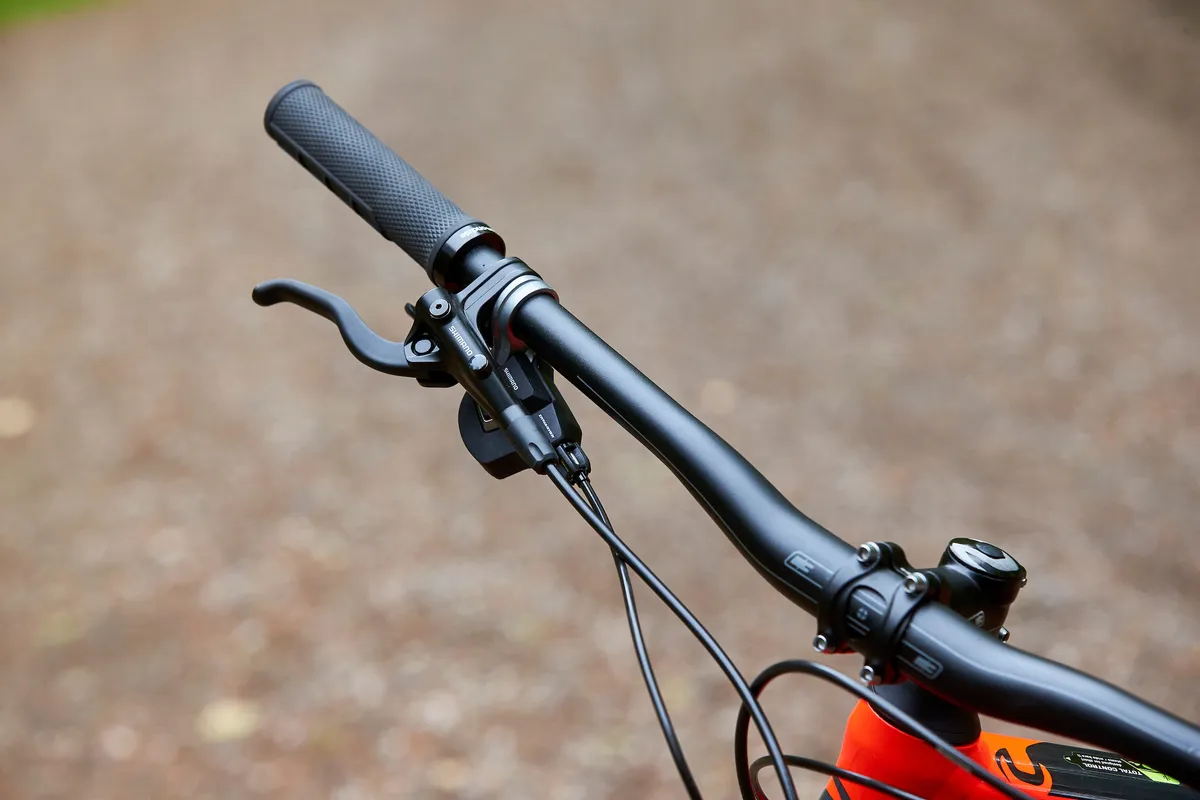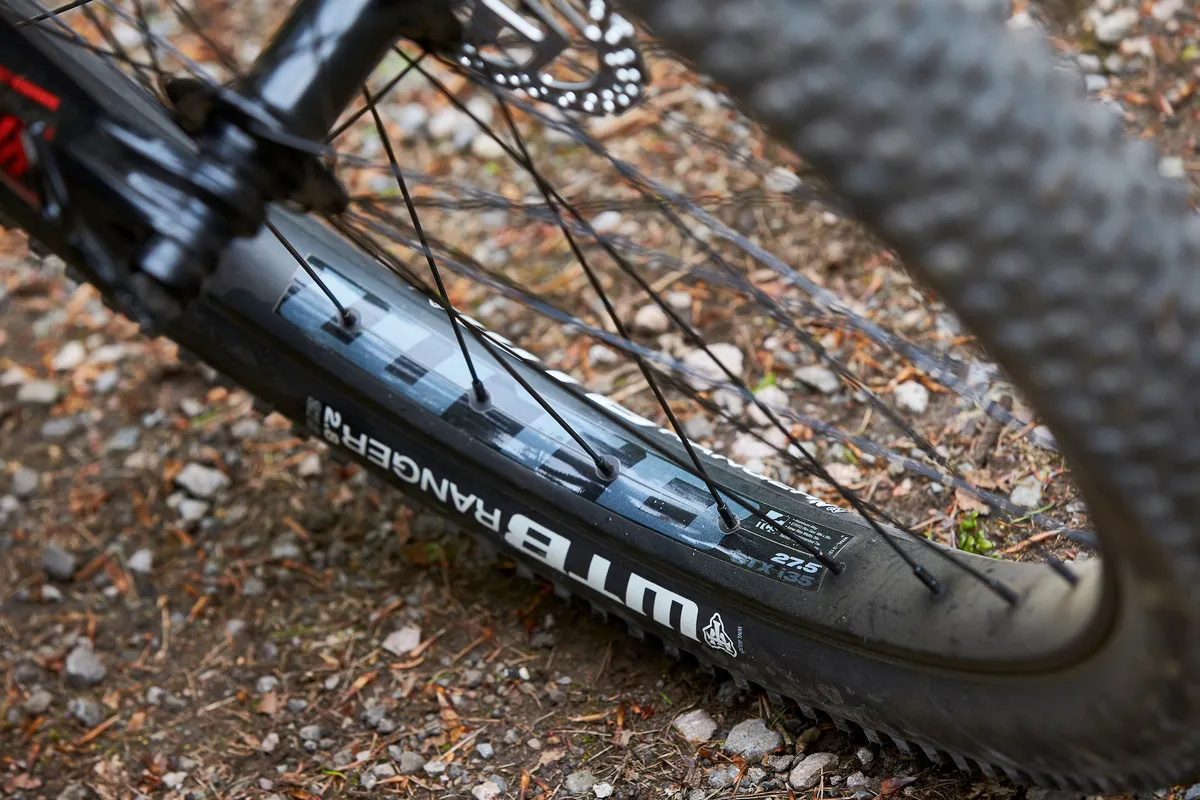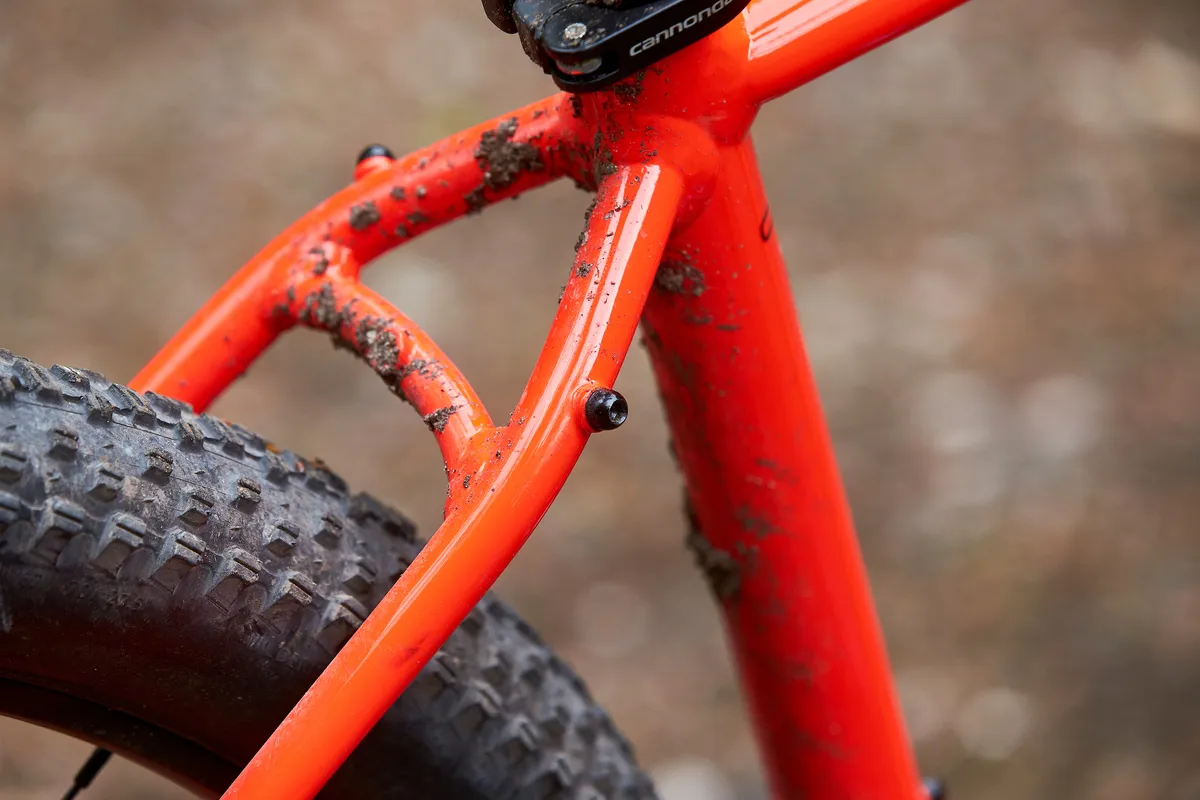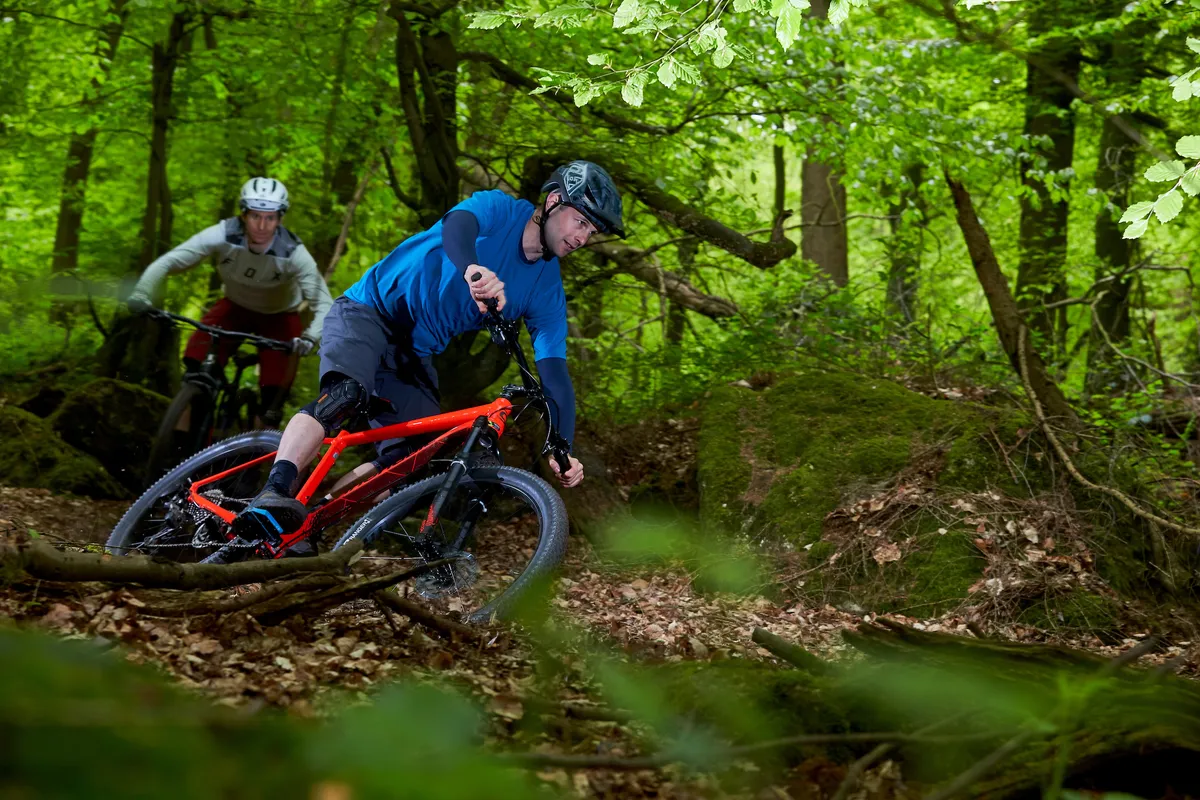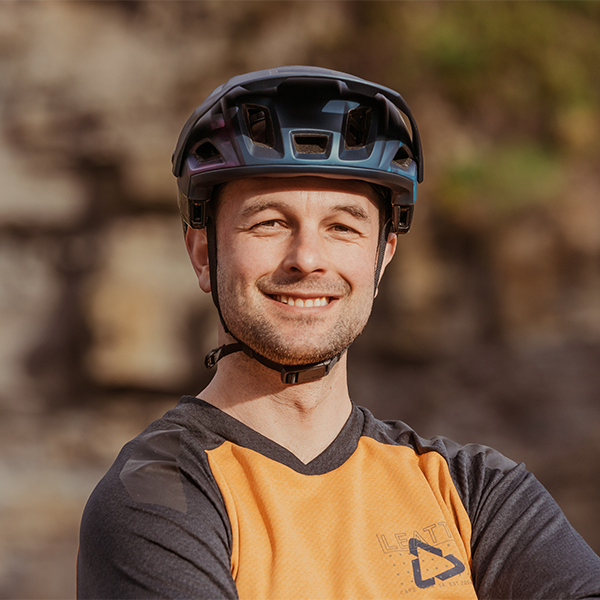The Cujo 1 is Cannondale’s range-topper in the ‘more fun, less faff’, trail-focussed hardtail range that shouts loud and proud about its aim of increasing smiles.
Supplied in a bold colour with 2.8in-wide plus tyres and ‘playful’ geometry I can see what Cannondale is hoping to achieve with this bike.
Cannondale Cujo 1 frame
Made from its SmartForm C2 Alloy, which sports the famous CAAD logo – a name that has a very reputable history in the cycling world – it has a Boost QR rear axle and two bottle mounts, rear pannier mounts and internal dropper post cable routing with a standard threaded bottom bracket (BB).
There’s a mounting plate for front derailleurs if a 2x setup is your tipple. The frame’s got two bottle cage mounts – one on the seat tube and one on the down tube – and on the size large I tested, it’s possible to insert the stock dropper post as far down as it’ll go without interfering with the bottle cage mounts. This might be an issue on smaller frames, though.
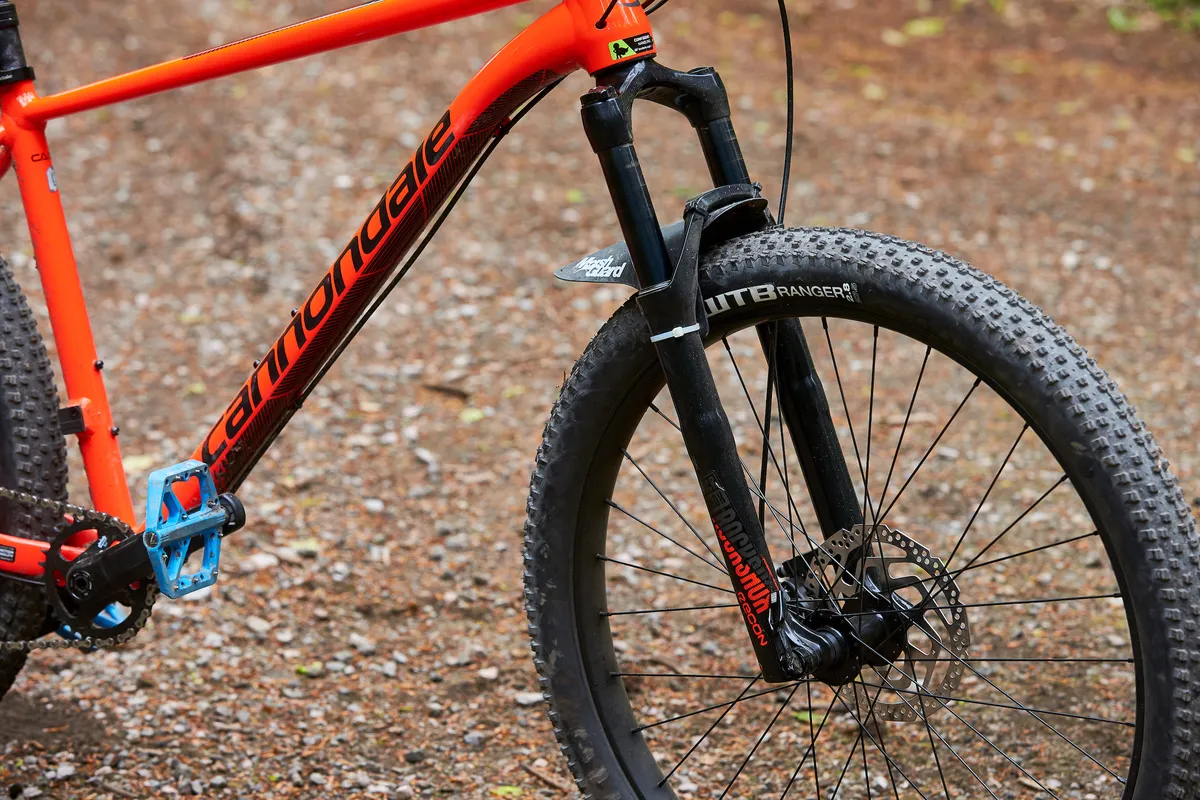
Based around a 120mm travel fork, the relatively steep 68.5-degree head angle is paired with a 1,146mm wheelbase and a 423mm reach. It’s also got a 308mm BB height.
On paper, at least, the Cujo’s geometry does make it a somewhat tricky bike to define. The head angle, reach and wheelbase suggest that the bike is best suited to beginners or cross-country, but the BB drop, fork travel and chainstay length all lean towards a machine with slightly burlier and gnarlier intentions.
Cannondale has tried to bring the bike together in the name of playfulness, hoping that when combined, it’ll turn into a bit of a thrash-and-bash smile-maker.
Looks-wise, the bike has a relatively simple silhouette with tubes that are neither chunky nor exceptionally skinny in their appearance.
As a result of finding enough space to accommodate the plus tyres, the rear end of the bike is exceptionally wide, still providing ample clearance around the massive tyres, especially where the seat and chainstays meet both the bottom bracket and seat tube.
Cannondale Cujo 1 kit
Cannondale has managed to squeeze some impressive parts on its bike for the budget. The 11-speed XT mech, RockShox Recon RL fork and TranzX dropper post are all more than welcome and seriously enhance both its perceived value and how it rides.
The choice to use plus tyres isn’t a bad one, and the 2.8in-wide WTB Ranger rubber is wrapped around WTB’s mega-massive STX i35 tubeless-ready rims.
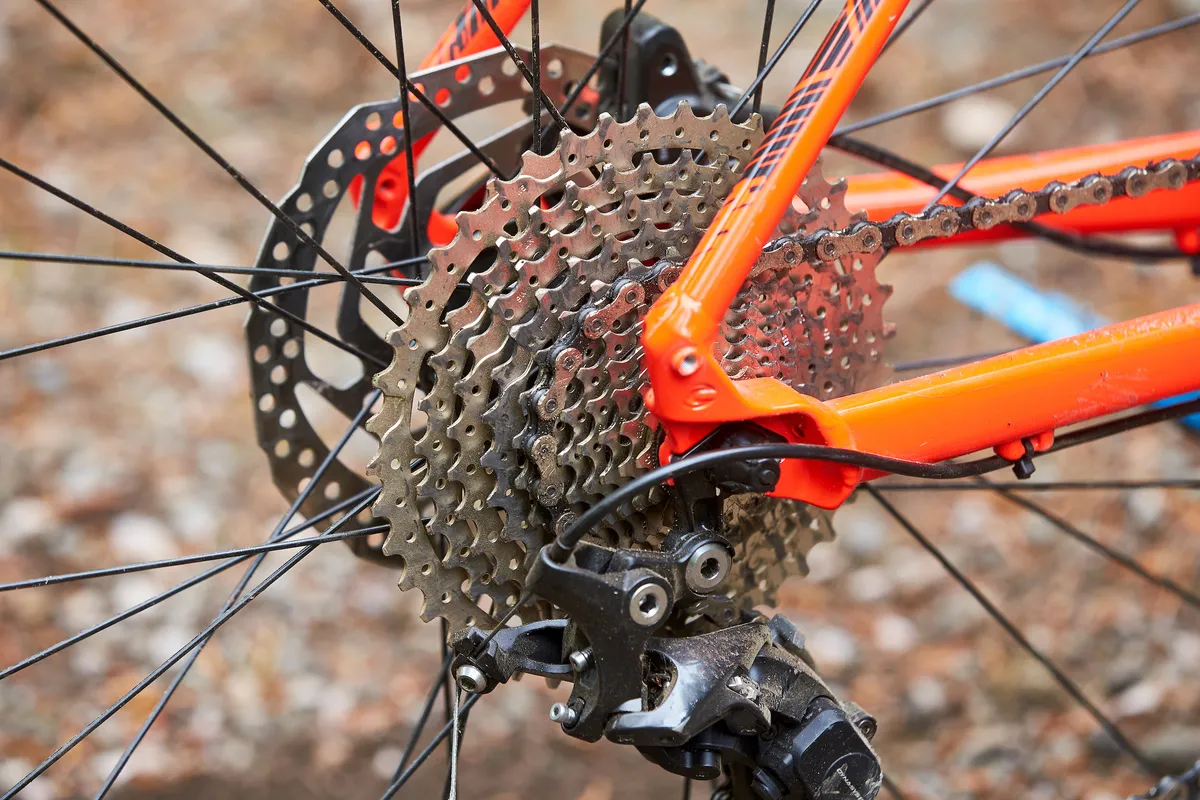
Cannondale has specced a Sunrace 11-42t 11-speed cassette with a KMC chain, FSA Comet crankset and a 30t narrow-wide chainring rather than opting for the full Shimano groupset in a bid to keep costs down.
Stopping is taken care of by Shimano’s MT400 hydraulic disc brakes that use a 180mm front rotor and 160mm rear.
Cannondale has done its best to reduce the number of own-brand parts on the bike with just the stem, saddle, bars and grips featuring its logo.
Cannondale Cujo 1 ride impressions
First impressions of the Cujo are positive. The bike feels plush and forgiving and doesn’t come across cumbersome when you’re just cruising along.
Thanks to the excellent Recon fork, coupled with the lower pressures you can afford to run in the 2.8in-wide tyres, it gives the bike a smooth-feeling ride from the get-go.
Despite the dropper post’s relatively short 120mm of travel – especially given the trend for droppers increasing in travel – it doesn’t feel like the bike needs more.
The drop on offer is adequate to get the post far enough out of the way on descents, while still extending to full height for climbs and when you’re riding the bike on undulating trails, rather than using it for a winch-and-plummet style of riding.
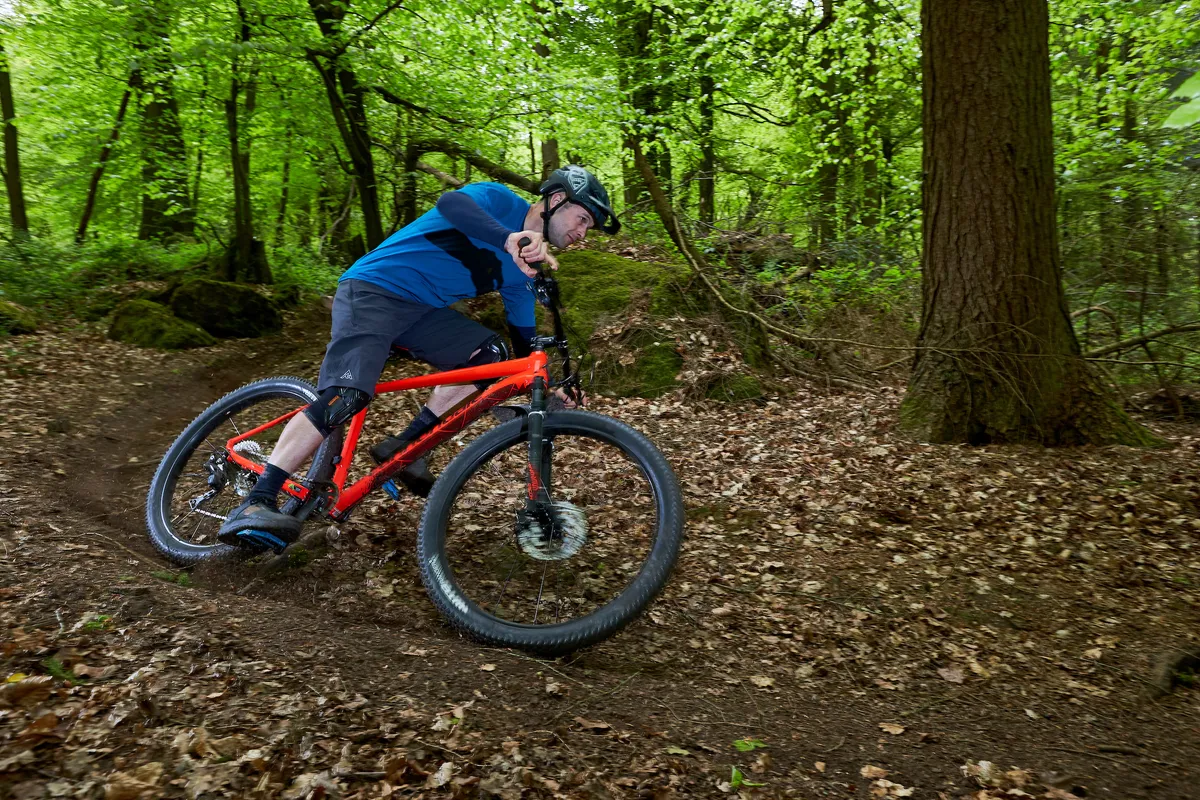
This also increases the potential for flow compared with bikes that don’t have droppers. When you’re stretching the bike’s limits, you’re going to want to reduce the saddle height further, but stay within the bike’s designated intentions and this shouldn’t be an issue.
While climbing, the large plus-tyres provided plenty of slow-speed grip on both wet and dry surfaces. You can quantifiably feel them biting into the terrain as you chug upwards towards the top of the climb. Increase speed, however, and there’s less grip on offer.
Up your pedalling cadence and the deformation of the tyres over bumps and through holes can create a bouncy feeling that hinders progress. The rather modest tread pattern on the WTB tyres struggles to penetrate the earth or deform around harder elements such as rocks and roots.
Start to descend and the rounded, balloon-like profile of the tyres made it difficult to find a cornering edge, reducing the tyre’s ability to bite in turns. This led to a rather vague and uncertain turning experience that required higher levels of rider confidence and skill to overcome.
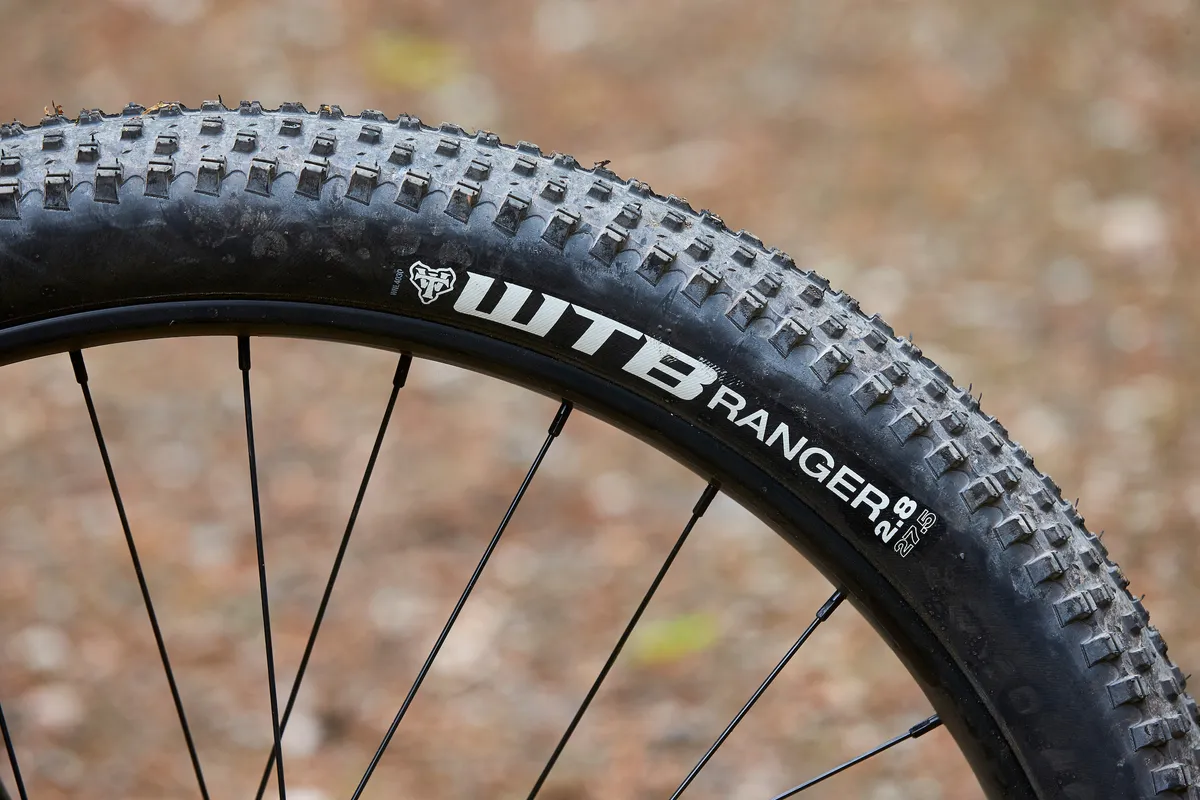
This was always going to be the payoff between having bump-damping absorption and the out-right cornering prowess and precision that comes courtesy of larger-volume tyres.
A possible solution to overcome this lack of steering accuracy would be to fit tyres with a more aggressive tread pattern, although this will increase rolling resistance.
It’s certainly worth noting that replacing the plus-sized rubber with standard or better-performing tyres can be costly – sometimes up to £90 for a decent tyre.
It would be fair to call the Cujo’s geometry conservative. While you’re climbing, this makes it easier to shift weight backwards and forwards, and smaller rider inputs have larger effects on the bike.
This makes the bike ride on the nervous side of neutral – lines are harder to maintain because you’re constantly having to make micro-adjustments to keep the bike on-line.
When it gets very steep, the shorter geometry does make it easier to get over the front of the bike to manage your grip, and in some cases, it’s more comfortable to be less stretched out when slogging it out uphill.
Because you’re already a long way forward on the bike when you’re climbing, the RockShox Recon fork has a tendency to bob more than a bike with longer reach and wheelbase figures.
Luckily there’s a lockout lever that counters this bobbing effect. That said, the forks are very supple and do remove a significant amount of trail buzz when they’re in the open position while climbing.
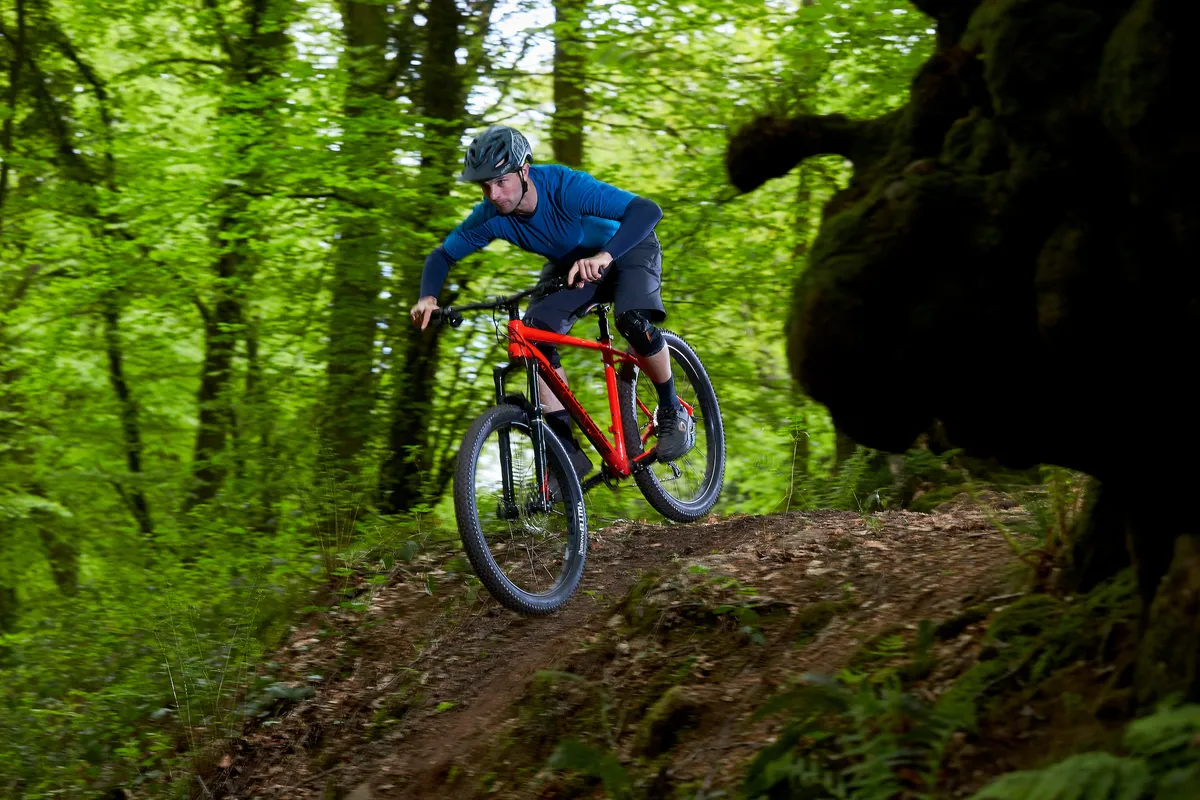
Hit the downhill and I’d agree with Cannondale that the Cujo is best suited to those who enjoy the ‘flick and thrash’ style of riding – the bike isn’t especially stable or composed when descending.
I feel that slackening the head angle out a touch and extending the reach would significantly benefit the overall ride of the Cujo without having any kind of detrimental effect on ride feel or performance.
Experienced riders will have even more fun on a bike they can ride faster and harder, and beginners won’t feel like they’re trying to tame a cat jumping from one hot tin roof to another as they pick their way along trails for the first time. That is assuming that more control equals more fun.
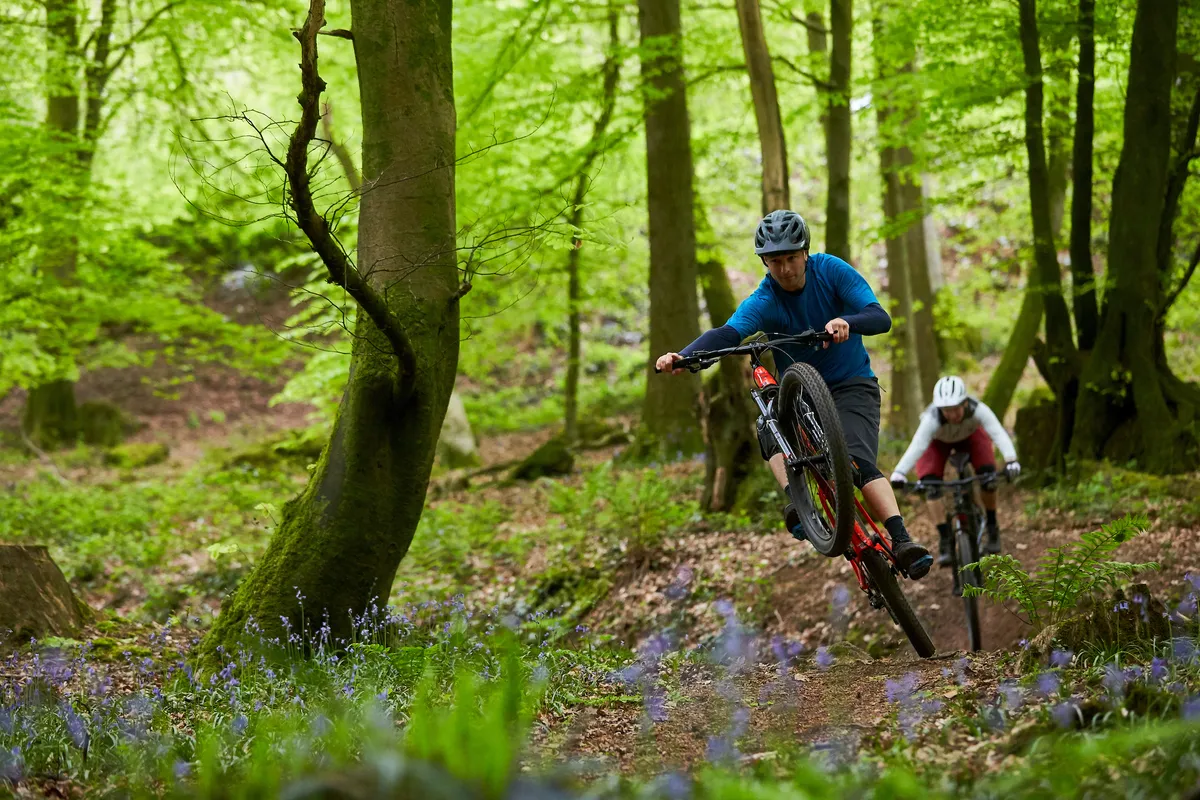
The bike’s spec is impressively redeeming though. The Recon RL fork’s 120mm of travel is well damped and controlled and the extra travel helps the bike to make light work of larger bumps and compressions, while being exceptionally supple and flattening trail buzz.
The XT-SLX mech and shifter combo provided faultless gear changes even when I was shifting under power. The 11-42t Sunrace cassette, when combined with the 30t chainring, contributes to a worthy partnership that won’t see you running out of gears on even the steepest of climbs.
Cannondale Cujo 1 geometry
- Size Tested: L
- Head angle: 68.5 degrees
- Seat angle: 73.3 degrees
- Seat tube: 48.5cm
- Chainstay: 44.2cm
- Wheelbase: 1,146mm
- Bottom bracket height: 30.8cm
- Reach: 42.3cm
For a little more: Cannondale Trail 1
- Price: £1,400
With traditionally-sized tyres and a SRAM NX 1x 12-speed drivetrain, the Trail 1 could suit those with a little more cash. It does forego a dropper post though.
For a little less: Cannondale Cujo 2
- Price: £900 / $1,300 / AU$1,499
The next model down loses the XT mech and dropper post and swaps the RockShox Recon for a Judy fork, but keeps the 2.8-in-wide rubber.
Product
| Brand | Cannondale |
| Price | A$1999.00, £1000.00, $1630.00 |
| Weight | 14.56kg |
Features
| Fork | RockShox Recon RL Solo Air, 120mm (4.72in) travel |
| Stem | Cannondale C3 |
| Chain | KMC X11 |
| Frame | SmartForm C2 Alloy |
| Tyres | WTB Ranger Comp 27.5x2.8in, DNA compound |
| Brakes | Shimano MT400, 180/160mm rotors |
| Cranks | FSA Comet MegaExo 30t |
| Saddle | Cannondale Stage 3 |
| Wheels | WTB STX i35 TCS, on Formula hubs |
| Headset | Semi Integrated, |
| Shifter | Shimano SLX |
| Cassette | Sunrace, 11-42t |
| Seatpost | TranzX 120mm travel (dropper) |
| Grips/tape | Cannondale locking grips |
| Handlebar | Cannondale C3 Riser |
| Bottom bracket | FSA MegaExo |
| Available sizes | S, M, L, XL |
| Rear derailleur | Shimano XT, Shadow Plus |
